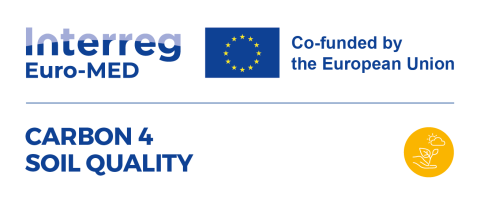Two of the biggest challenges of human civilisation are how to reduce CO2 in the atmosphere and how to preserve the soil quality. Too much carbon in the air causes greenhouse effect, and too little carbon in the soil reduces soil quality.
Proposed project will prepare scientific foundations for reducing CO2 in the air and storing it into the soil, using SUSTAINABLE SOIL MANAGEMENT, called "CARBON FARMING". Since carbon farming is innovative topic in EU (policy emerged in 2021), there is an urgent need to quickly define standards, monitoring procedures and socio-economic models to test carbon farming in future.
CARBON 4 SOIL QUALITY project will prepare "Toolbox for carbon farming" consisting of (i) Catalogue of soil organic reference values, (ii) Methodology for organic carbon analysis and soil quality monitoring (iii), Guidelines for carbon farming techniques, (iv) carbon farming business models, (v) Recommendations on agriculture carbon credit schemes and environmental certification systems.
Action plan will be prepared on the transnational level to properly plan testing phase. It will consider at least 5 testing sites in different countries, including at least one IPA country and one new Interreg Euro-MED territory.
Transnational cooperation is needed for studying different Mediterranean climate zones (sub-tropical, oceanic, semi-arid, arid), different erosion conditions and different types of soil.
Project follow-up will test carbon farming techniques to support farmers with practical knowledge, how to increase soil organic matter. This will improve plant nutrients, increase soil water storage and provide good habitat for soil living organisms, which enhances soil biodiversity.
Carbon farming is considered as one of the European Green Deal climate actions and related EU policies will be developed in the 2023-2030 period. If approved, this project could become SUSTIAINABLE SOIL MANAGEMENT lighthouse example of Euro-MED territory and showcase for the EU.
Thematic areas
Biodiversity Business dimension Carbon farmingProject contribution to Mission Soil’s:
Specific objectives
-
 1. Reduce land degradation relating to desertification
Not targeted
1. Reduce land degradation relating to desertification
Not targeted -
 2. Conserve and increase soil organic carbon stocks
Targeted
2. Conserve and increase soil organic carbon stocks
Targeted -
 3. No net soil sealing and increase the reuse of urban soils
Not targeted
3. No net soil sealing and increase the reuse of urban soils
Not targeted -
 4. Reduce soil pollution and enhance restoration
Not targeted
4. Reduce soil pollution and enhance restoration
Not targeted -
 5. Prevent erosion
Not targeted
5. Prevent erosion
Not targeted -
 6. Improve soil structure to enhance habitat quality for soil biota and crops
Partially targeted
6. Improve soil structure to enhance habitat quality for soil biota and crops
Partially targeted -
 7. Reduce the EU global footprint on soils
Not targeted
7. Reduce the EU global footprint on soils
Not targeted -
 8. Increase soil literacy in society across Member States
Not targeted
8. Increase soil literacy in society across Member States
Not targeted
Operational objectives
-
1. Build capacities and the knowledge base for soil stewardship
Not targeted
-
2. Co-create and upscale place-based innovations to improve soil health in all places
Partially targeted
-
3. Develop an integrated EU soil monitoring system and track progress towards soil health
Partially targeted
-
4. Engage with the soil user community and society at large
Partially targeted
Innovation hotspots
-
1. Carbon farming
Targeted
-
2. Soil pollution and restoration
Not targeted
-
3. Soil biodiversity including the microbiome
Targeted
-
4. Circular economy solutions
Not targeted
Cross-cutting dimensions
-
1. Business
Targeted
-
2. Digital
Not targeted
-
3. Territorial
Partially targeted
-
4. International
Not targeted
© European Union, 2024. Image sources: Adobe.Stock.com
